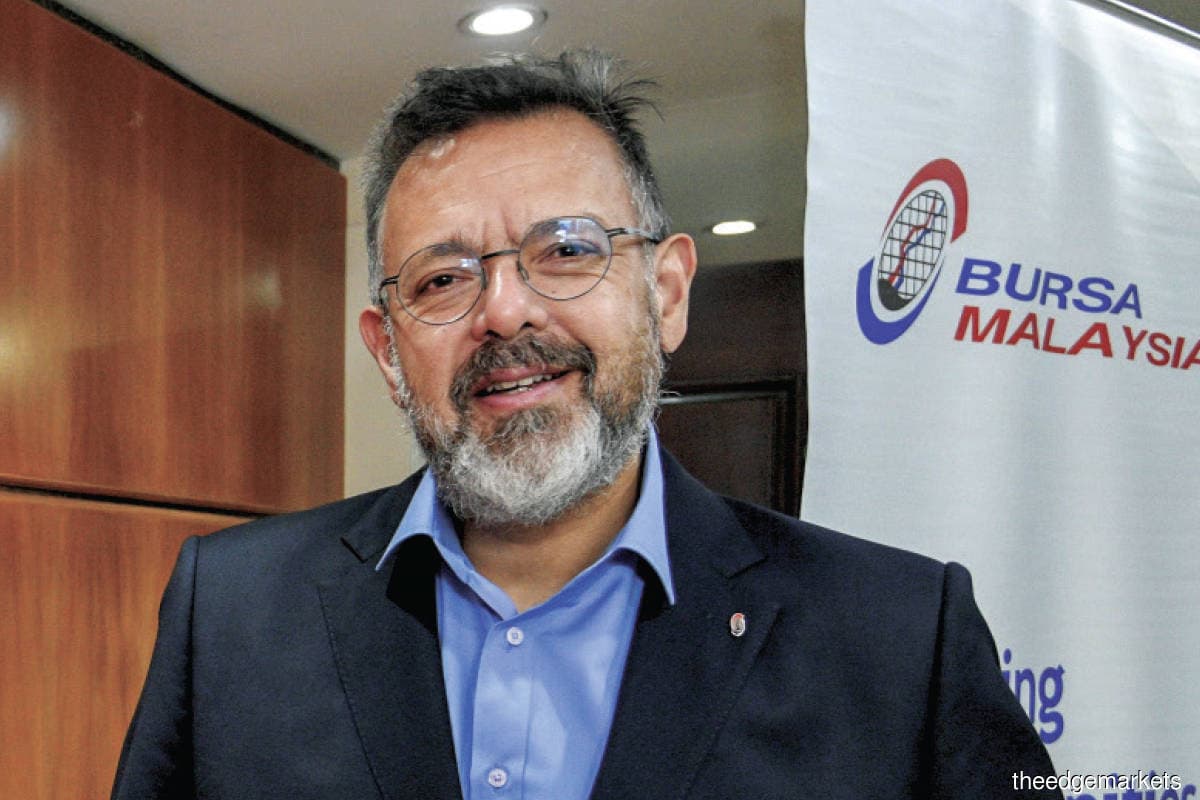
This article first appeared in The Edge Malaysia Weekly on March 6, 2023 - March 12, 2023
THE next three years will be crucial for the green transition of public listed companies (PLCs) on Bursa Malaysia, starting with Main Market players being given a FTSE4Good environmental, social and corporate governance (ESG) rating from this year onwards, based on their public ESG disclosures.
Such disclosures by the PLCs will be made compulsory from December this year, while Bank Negara Malaysia will require banks to incorporate the principles of the Task Force on Climate-Related Financial Disclosures (TCFD) — which was established by the Financial Stability Board — in investment and lending decisions from 2024. The TCFD will be made part of Bursa’s listing requirements from 2025.
Bursa CEO Datuk Muhamad Umar Swift tells The Edge in an interview that the regulator has been reaching out to larger corporates to enquire what is being done in their path towards carbon neutrality.
“Are you a responsible corporate that goes beyond just being responsible for your own scopes and missions? What are you doing in your glide path to neutrality and net zero? Are you bringing your supply chain with you? That presents an opportunity for Malaysian corporates to displace their competitors,” he says, adding that the TCFD calculator is the starting point for companies to establish where they stand in order to begin their ESG journey.
To this end, Bursa has launched a pilot project with four banks to identify and address companies with critical ESG gaps via an initiative known as #financing4esg, which has created about RM6 billion worth of sustainable financing opportunities for companies seeking better investability.
Transactions worth RM5 billion have been concluded since November 2021, when the initiative was launched by Bursa with OCBC Bank and Alliance Bank. HSBC Amanah Malaysia Bhd and CIMB Group Holdings Bhd joined last year. The regulator is now in talks to bring Malayan Banking Bhd on board.
“We have seen success in sustainability-linked loans and bonds for large corporates wishing to improve their ESG ratings, as well as [bigger] SME players with initial public offering and ESG aspirations. There has also been great interest among solar/renewable energy solution providers and we have developed an SME financing programme driven by data analytics to reduce conventional customer acquisition costs,” says Umar.
Currently, there are about 950 companies listed on Bursa, 300 of which already have a FTSE4Good rating.
To incentivise smaller companies to make complete and accurate ESG disclosures, Bursa has offered advisory services at affordable rates and published a Sustainability Reporting Guide and other toolkits on its website, while its directors have hosted educational sessions. In collaboration with FTSE Russell and The Edge, it has recognised the best performing listed companies in ESG excellence via The Edge ESG Awards.
“We are now focusing on smaller companies that are less prepared, to help them by way of our FTSE4Good methodology. Many want to improve their understanding of ESG awareness, disclosure points and best practices that are aligned with international standards. ESG advisory is a starting point,” says Bursa senior executive vice-president of data, index and ESG business Wong Chiun Chiek on the stock exchange regulator’s facilitator role between corporates and banks, given how standardised data is lacking.
To establish “greener intelligence in the ecosystem”, the regulator is looking out for three categories of companies. The first are advisory firms with a scalable model and proven track record.
The second are financial technology (fintech) and other technology companies that help improve the efficiency of sustainability reporting. The third are specialist data companies that have unique data sets that complement disclosure data on ESG and climate change.
Targeting smaller corporates, SMEs
“There needs to be a mechanism to allow [ESG disclosures] to take place. We are enhancing our reporting platform by facilitating this. Currently, we have a PLC transformation programme as well as a reporting module to help corporates with this,” says Umar.
“When we engage SMEs [for ESG matters], they ask why, since their customers are not asking for it. But when we look at supply chains, we notice that customers are [looking for ESG compliance]. Therefore, this has to be an inclusive journey,” he points out, adding that the process takes time.
As it stands, most companies still view ESG disclosures from a “purely compliance perspective”.
On how stock exchanges in the region collaborate and where Bursa-listed companies stand in comparison, Umar says there is constant conversation between bourse regulators on their products and observed market behaviour.
“We are all moving together, at about the same speed. The point [in our conversations was] mandatory disclosure. We saw that as a differentiating factor and we have started that. Now, the conversation is about how we facilitate mandatory reporting. Some of the things we discuss are standards and ensuring that the tools we use are nimble enough,” he adds.
Save by subscribing to us for your print and/or digital copy.
P/S: The Edge is also available on Apple's AppStore and Androids' Google Play.